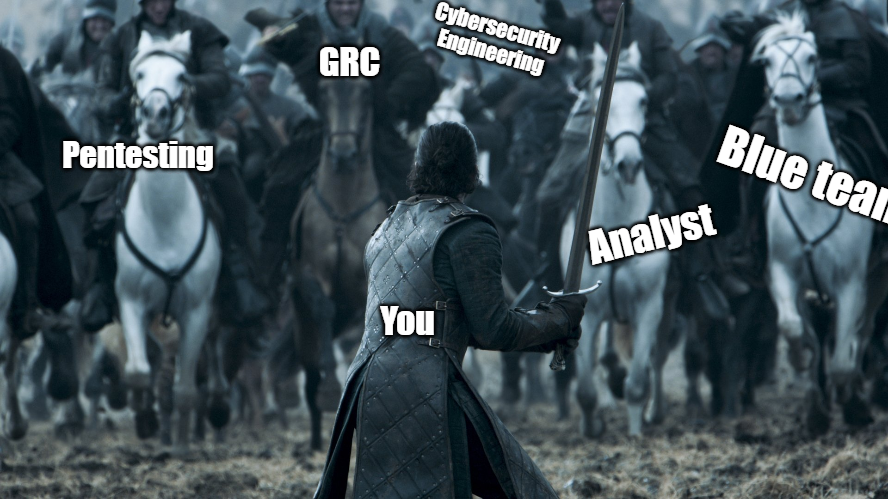How To Get Started In Cybersecurity: A Comprehensive Guide

Alright, fellas, I've never been asked a more repetitive question before. It's always "How can I break into Cybersecurity" and never "How is Damian doing". I get asked how to break into this field more times than I've seen the rise of the sun.
This is why I have created this guide. It's notes taken from my personal experience and advice from more experienced professionals in the field, resources listed here are also free!
Baby Steps First

Look, the thing about Cybersecurity, like any other career path is you can't skip the basics.
Computer Basics

This is just understanding how to use a computer at the very least. In this day and age, everyone can, but can you USE a computer?
What I mean is, that using a computer to watch anime or play a game amongst other "normal" things, puts you in the category of the average consumer.
A particular resource to get you ahead of the normies would be Professor Messer's CompTIA A+ YouTube series. It's free and will teach you the basics of computer Hardware, Software, Troubleshooting and so on.
Networking

This is the oxygen to your hydrogens. It's essential to make your understanding of Cybersecurity concepts flow like water.
To understand why you have to do Cybersecurity in the first place, you have to understand the way computers communicate, which is what Networking is about. You can learn the basics using the following resources:
1. Professor Messer's Network+ free YouTube series
2. NetAcad Network Basics
Linux

Windows systems dominate the consumer market. Y'know, the normies, but other operating systems (OS) exist like the MacOS, and a core focus in the Cybersecurity industry, Linux operating systems.
While Windows systems and MacBooks dominate the consumer market (yeah, the normies), Linux dominates somewhere else; the Internet. A vast majority of the internet runs on a Linux-based operating system and a lot of the tools used by Cybersecurity professionals are found in Linux systems as well.
While any of the mentioned OSs could perform well for a Cybersecurity professional, I find Linux to be much easier to use.
Here are resources you can learn Linux from:
1. LinuxJourney
2. FreeCodeCamp Intro To Linux YouTube Playlist
Cybersecurity Concepts/Practices

Understanding what the deal is with Cybersecurity shouldn't have to be mentioned, but let me properly direct you to the recommended resources:
1. TryHackMe's Intro to Cybersecurity path
2. Professor Messer's Security+ YouTube series
Programming (Just a lil 🤏🏾👀)

I understand that a lot of people want to avoid this, but please don't. Especially if you want to get into a technical role in the industry. In my experience, I have noticed how much programming becomes quite relevant as I advance in my career.
That said, you don't have to become some super programmer. The least you should be able to do is read code and write small scripts to make your workload lighter through automation.
Speaking of automation, I recommend that you learn Python and BASH (some HTML and JavaScript wouldn't hurt). Program small projects to get the hang of it. It also looks great on your resume/portfolio.
Where to learn?
1. FreeCodeCamp
2. BASH Academy
Done with the basics? Let's...
Find Your Niche

You've found out about Cybersecurity and chances are, you want to become a hacker. It sounds fun, doesn't it? Let's...back up a little.
There are numerous Cybersecurity paths, it's quite ridiculous.
We've got Pentesting, GRC, Red Teaming, Blue Teaming, Purple Teaming, Technical Writing, Cybersecurity Engineering, SOC Analysis, Cybersecurity Sales, and that's just scratching the surface.
The large amount of roles may be daunting and it can be hard to figure out which one you want, but here's how you could do it:
Research.
Yup, you have to do some research on what these various roles mean. How I would do it is simply Google it and then see if there are videos about the role. I'd listen to professionals about what it takes to work in that role, such as skillset and activities and then I would build on it by practicing. Worked out fine for me.
Another thing is to figure out if you like technical roles or non-technical roles. This helps narrow down the ideal job type for you.
Wanna get hired now? Of course, you do. But first, you need to...
Get Certified

For each role, there are several industry-standard certifications and there are general certificates as well (regardless of the role). These certificates, depending on where you're from and the level of difficulty of the exam would typically dictate how pricy it would be.
These general certs are:
1. CompTIA Security+
2. CompTIA Network+
3. CompTIA Cysa+
4. CEH (Not a fan)
5. eJPT
6. OSCP
7. PNPT
These certs appear a lot in job descriptions and make your chances of getting an interview much more likely (not certain).
FAQ

Q: Do you need a degree to get a job?
A: In some cases, you do. At the moment, I have a job in Cybersecurity and do not have my degree yet, nor has being a student helped. Many get jobs without a degree, so don't lose hope.
Q: Do you need to learn programming to get into cybersecurity?
A: Depending on context, no. I have already explained this above.
Q: What is the pay range of a Cybersecurity professional?
A: It varies per region, company budget, and your level of experience. You could do some research to get an idea of it.


